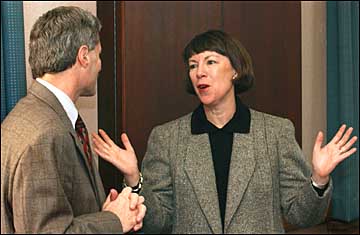|
|
|
|
|
November 22, 2002Ag dean finds university stimulating, rigorous
Catherine Woteki is no stranger to large, complex organizations. She was an undersecretary in the U.S. Department of Agriculture. She was deputy associate director in the White House's Office of Science and Technology Policy. She led the Food and Nutrition Board in the National Academy of Sciences' Institute of Medicine. The experiences prepared her well for taking on leadership at another large, complex organization -- the College of Agriculture. A year ago this month, Woteki was named ISU's ninth dean of agriculture. She started work on New Year's Day. After steeping in the university culture for almost a year, Woteki admits academic life has a rigor all its own. "The amount of intellectual engagement required in academic and scientific issues has been deeper and broader than I could have imagined," she said. "But that's what makes Iowa State an exciting place to be. It's so intellectually alive, from our students to our most senior faculty." Numerous road trips One of her biggest challenges has been the dual responsibility of getting to know campus and the rest of the state at the same time. Which, for many days, has meant burning the candle at both ends. During the past several months, if you'd have asked about upcoming open days on Woteki's schedule, the dean's secretary would just smile and start flipping calendar pages. And flipping. And flipping. Woteki has accepted scads of invitations for meetings, speeches and events. She has spent almost a dozen days on community visits across the state, and more are lined up the next few months. On the visits, she has met with farmers, business people, community leaders, high school and community college students, alumni, donors and news media. She has taken the podium at Rotary meetings, faculty gatherings, national conferences and research field days to speak on topics as diverse as biotechnology, food safety, women in science, bioterrorism, sustainable agriculture, consumers' diets and globalization after 9/11. Pretzels and M&Ms She regularly attends meetings with leaders of Iowa's agricultural groups. In her first semester, she visited each of the college's 17 departments. Once a month, over bowls of pretzels and M&Ms, she convenes a small group of students to chat about what's on their minds and give a dean's-eye view of current college issues. During her community visits, Woteki has learned more about what Iowans expect from the College of Agriculture. "First and foremost, they want a quality education for their sons and daughters," she said. "They also want the college to address problems in ways that will help their farms thrive, their businesses prosper and their communities remain vital. That gets at the kind of special relationship of service the college historically has had with Iowans, which is solidly grounded in the land-grant mission." Unlike predecessors People have been curious about how Iowa would react to an agriculture dean who didn't come from a traditional agricultural discipline (hers was human nutrition), didn't have a typical agricultural upbringing (because her father was a career fighter pilot, she moved around a lot), and, unlike her eight predecessors, wasn't a man. "The bottom line," Woteki said, "is I couldn't have asked for a warmer reception. People across the state have welcomed me into their homes, farms and businesses, and have shared with me their concerns and hopes for the future. Because of this openness, I have a much better appreciation of how important and integral agriculture is to the future of this state." Many of the satisfactions of the past 11 months center on people, Woteki said. "Last spring, 420 students graduated from the college, our largest class in nearly 20 years. Even in a stressed economy, 82 percent of last year's graduates had jobs and another 17 percent are pursuing advanced degrees. "Our faculty have been recognized for extraordinary accomplishments, including the election of Donald Duvick in agronomy to the National Academy of Sciences and the award to Max Rothschild in animal science as Iowa Inventor of the Year." Woteki also is enthused about the start of new initiatives that will be high priorities for the college, including the Institute for Food Safety and Security and the Center for Integrated Animal Genomics. At work on book Although her pace remains hectic, Woteki is committed to staying in touch with her discipline. She will find a way to squeeze in the continuing education credits required for maintaining her certification as a registered dietitian. As a professor of food science and nutrition, she has been working with a graduate student to write food-safety policy papers. She is writing a book exploring the question of what makes food fit to eat, including a scientific understanding of food safety and the strengths and weaknesses of the national regulatory system. Woteki and the College of Agriculture are in the middle of forging a strategic plan that will provide a new vision and mission for the next five years. "We will take the view that agriculture is essential to the life, health and economic vitality of Iowa, the region and the nation," Woteki said. "We will position ourselves to provide leadership in research, education and service, and continue to be a major force for opportunity and positive change." |
|
Ames, Iowa 50011, (515) 294-4111 Published by: University Relations, online@iastate.edu Copyright © 1995-2001, Iowa State University. All rights reserved. |
